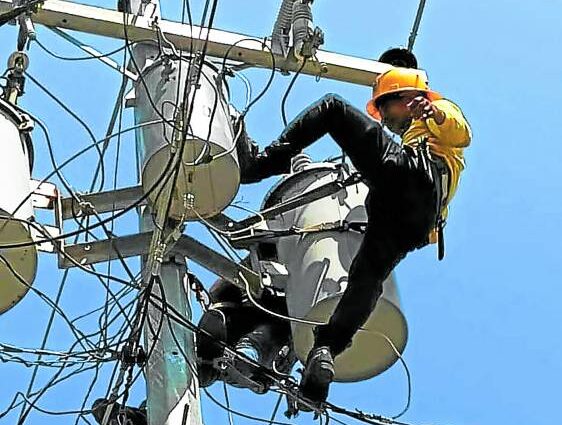
POWERING UP Two linemen for the Occidental Mindoro Electric Cooperative fix electric power cables connected to transformers days before the sole electricity supplier for the
province agreed to run all its three generators at full capacity to end the weekslong outage. —CONTRIBUTED PHOTO
The Department of Energy (DOE) on Thursday said “yellow alerts,” which indicate thinner power reserves to meet any surge in demand, are expected in Luzon during the seven weeks of the summer season—four in May and the first three of June.
“It’s possible that the yellow alerts may occur in any of the seven weeks; after that, it would be about once a month in the second half of the year,” Energy Undersecretary Rowena Guevara said during the televised Laging Handa public briefing.
A yellow alert does not necessarily lead to power outages. Only when a transmission line or power station goes offline and the reserves fail to meet the demand will a red alert be issued, resulting in rotational brownouts.
In the Visayas during the same period, the official said yellow alerts were not likely to occur in the daytime but five such alerts were possible in the evenings.
She said no yellow alert was anticipated in Mindanao, which has been enjoying a surplus of electricity.
The reopening of the Ilijan power plant in Batangas province on May 26, according to Guevara, would be timely as it could beef up electricity supply in the Luzon grid.
“We expect it to contribute 1,200 megawatts (MW) to our (total) power supply and that’s a big thing. If it starts running this May, it’s possible that the yellow alerts anticipated for June would be voided,” Guevara added.
As of Thursday, data from the Independent Electricity Market Operator of the Philippines showed that demand in the Luzon grid was at 11,684 MW, while supply stood at 13,300 MW.
Contingency measures
The energy official said the DOE has several measures in place to ensure a steady supply of electricity and to prevent aberrations such as the one that occurred last Monday when a red alert was raised and rotational brownouts imposed after lightning struck a transmission line and two units of a power station went offline in Zambales province, resulting in the loss of 630 MW in the Luzon grid.
Guevara said the department has requested power plant operators to reschedule the preventive and general maintenance of their plants so that these would not have to go offline during summer.
“We assisted our generators so that they can transfer their maintenance plans to before and after summer, so that for the entire summer, we won’t have a generator that would be shutting down,” she said.
Energy conservation
Guevara added that the DOE was also assisting power generators get the necessary government permits so that they could open as scheduled this year and add 1,000 MW of renewable energy to the grid.
The department, she noted, was likewise evaluating the transmission line projects of the National Grid Corp. of the Philippines, which operates the country’s electricity backbone, to ensure the interconnectivity of the country’s grids.
Guevara said the Mindanao-Visayas Interconnection Project, Cebu-Negros-Panay Project III, and San Jose-Hermosa Transmission Line expected to be completed by August would lessen the chances of yellow alerts occurring for the rest of the year.
In the meantime, households and offices should continue energy conservation measures such as fixing air-conditioning units to a 23-degrees Celsius setting, using energy efficient appliances and equipment, and convincing more Filipinos about the merits of saving electricity.
“We need to help one another because the problem of our power supply is the problem of all people. All of us have a way to help, all of us are part of the solution,” the DOE official said.
Higher Meralco rates
The tight power supply is already being reflected in higher electricity prices.
Customers of Manila Electric Co. (Meralco) have been advised to brace for an increase in their electricity bills this month due to higher generation charges, or the cost of electricity from power plants.
Meralco spokesperson Joe Zaldarriaga warned that higher electricity rates might persist until June since the dry season was expected to persist until then, thus triggering increased demand amid thinning supply.
“Historically, there is high demand in the months of May and June. If consumption increases, we need to expect an increase in electricity bills as well,” he said at a press briefing.
Meralco on Thursday said there would be an increase in its electricity rate for May by 17.61 centavos a kilowatt-hour (kWh), bringing the overall bill of a typical household to P11.4929 a kWh from P11.3168 in April.
This means residential customers consuming 200 kWh a month can expect an increase of P35 in their monthly billings.
According to Meralco, demand in the Luzon grid peaked at 12,235 megawatts (MW) on April 19, breaching last year’s record of 12,113 MW that occurred on May 12, 2022.
Higher demand triggered an increase of P1.7367 a kWh in spot market charges, resulting in a higher generation charge of P7.6697 a kWh.
Supply and demand movement in the spot market is among the factors that influence electricity rates, as distributors such as Meralco buy power from suppliers who trade in the Wholesale Electricity Spot Market.

